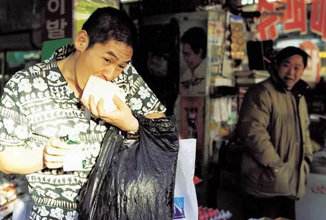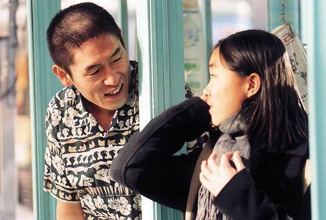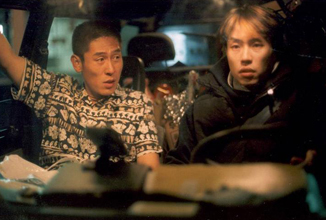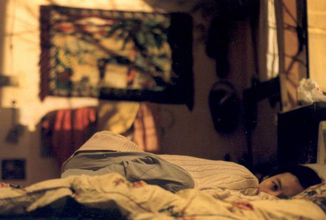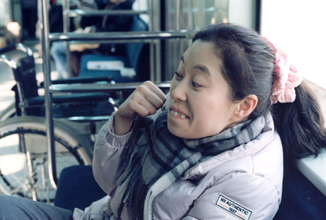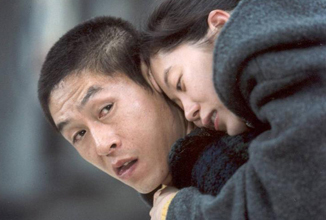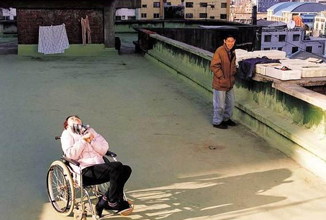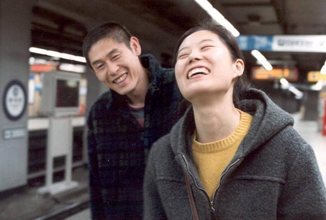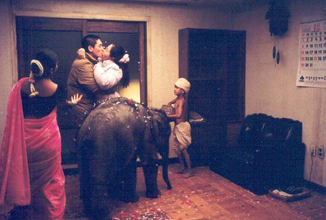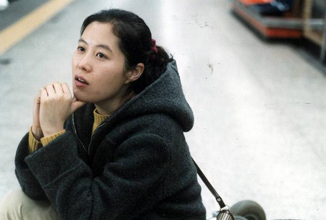
 |
||||||||||||
Go to see almost any of the average, widely released film romances or melodramas at your local multiplex and you are likely to be presented with images of impossibly beautiful characters whom film studios believe viewers can easily aspire, or be attracted, to and stories that cross no boundaries, address no taboos and are simply aimed at the largest mass audience possible. Unsurprisingly these types of films are two-a-penny and most are at best banal and forgettable.
Oasis tells the story of Jong-du (Sol Kyung-gu), a man of limited mental competence, who at the start of the film is released from prison having served two and a half years for involuntary manslaughter while driving under the influence of alcohol. On returning to his family home he finds that his mother, brothers and brother's wife have moved without telling him, even changing their phone numbers, and his younger brother is only tracked down by the police when Jong-du is arrested for eating food without having the money to pay for it. Finally taken to his family's new home, it quickly becomes clear that he is not entirely welcome and after several lectures from his older brother about growing up, the responsibilities of being an adult, the need for him to start trying to understand the consequences of his actions and the need to fit into society he decides that one way to do this would be to visit the family of the man whom he was convicted of killing to "Say hello and see how they're doing". He is, of course, unceremoniously kicked out but not before meeting the dead man’s daughter, Gong-ju (Moon So-ri), who suffers from cerebral palsy. He later returns to see her again but when she spurns his attempts to become intimate he sexually assaults her. For reasons which become clear later Jong-du gets a phone call from Gong-ju a couple of days later and, against all the odds, they begin a romantic relationship…
The first time we see Jong-du is in mid-winter on his release from prison wearing the same summer clothes that he wore when his jail term began (while all around him are wrapped up in thick winter clothes) and by this alone Lee-Chang-dong immediately gives us a foreshadowing that Jong-du is different from most people and really doesn’t fit in. Everywhere he goes and almost every interaction he has results in him being pushed away, essentially back to the outskirts of society, and his lack of understanding of situations he finds himself in simply makes matters worse leaving him even more alienated and marginalised.
Oasis is confrontational and uncomfortable yet at the same time incredibly beautiful and moving. The heartfelt love between the two main characters really shows and Lee Chang-dong, as always, concentrates on telling the story as it needs to be told rather than trying to make a film by second guessing his audience reactions. The scenes showing our couple's imagined relationship as individuals without handicaps are astoundingly powerful when juxtaposed with the reality of their situation and viewers will find that as the film progresses they begin to see the characters without seeing their limitations.
Sol Kyung-gu and Moon So-ri both give phenomenal performaces throughout the film. Sol Kyung-gu brings a childlike innocence to his character and uses the smallest and subtlest of gestures to speak volumes. However there is almost no way to convey in text just how amazing Moon So-ri's portrayal of Gong-ju really is. At no time does it appear that she is an actress playing a handicapped person and unless viewers have prior knowlegde of her they would be forgiven for believing that the part is played by someone actually afflicted with cerebral palsy. Oasis does deserve to be seen for many reasons but her performance is so jaw-droppingly good that it alone makes it unmissible.
The cinematography is very reminiscent of a documentary and all cinematic "film" styles are jetisoned to bring a feeling of realism crashing through the screen. Keeping with this the film uses very un-filmlike lighting and a great deal of the camera work is hand held. Though Oasis uses virtually no music in the soundtrack the overall resultant effect works so well that viewers will almost not notice its absence. Summary:
|
||||||||||||
All images © Third Window Films, Fusion Media Sales and CJ Entertainment Review © Paul Quinn, 2009 |
||||||||||||

